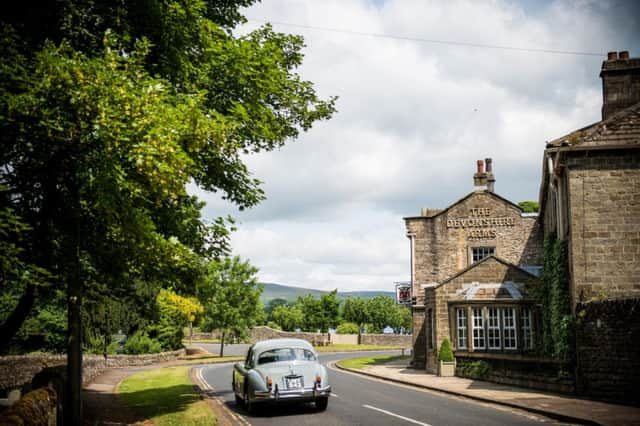Travel: Yorkshire thrills


One day I’ll learn how to take photos. Good ones. Ones that show a mist lifting from a valley, so that each of the hills from the middle distance to the blurred horizon gets bluer and greyer, and which capture the way in which the sun shines through, low on a winter’s morning, and makes the meadows in the foreground the kind of translucent green that you’d expect to see if the world had just been born.
Until then, all I’ve got is my memory. Walking to Appletreewick, a tiny two-pub village on the east side of Wharfedale in the Yorkshire Dales as pretty as its name, the tower of Burnsall church rising up through the mist in the valley below, was like stepping into a golden Fifties dream of an unchanged Britain.
Advertisement
Hide AdAt the Craven Arms in Aptrick (as the locals call it), I sat outside to drink my pint. It was warm enough to take off my jacket, even in late November: no wind, and the last leaves still on the bare branches. My mother always told me there’ll be days like this, as Van the Man used to sing.
The odd thing is, I always used to rather look down on Wharfedale. It was just too near to industrial west Yorkshire’s last grimy tentacles, with none of the wildness of Swaledale or its menacing moors, or the magnificent lonesomeness of upper Teesdale. Wharfedale, I used to think, was too tame, too obvious, too crowded: the wait-for-a space carparks of the Cavendish Pavilion, the shoppers for knick-knacks struggling up the main street at Grassington, a street so steep that they’ve put a defibrillator at the top.
Yet on days like this, it felt like a magical valley, its villages a companionable lattice on the map, each just a couple of miles apart, some of them with paved walks through the fields between them. In reality, I know, it’s not the paradise it looks: one in four houses within the Yorkshire Dales National Park are second homes or holiday cottages, and a conference in Leyburn last year warned that the area could soon be a tourist theme park with nothing else but pubs and fine hotels on offer.
Whether or not pubs and fine hotels are the key to the future, though, they certainly are to the past. The Craven Arms in Appletreewick, for example (“the Yorkshire Inn you always hoped to find,” it boasts, not unfairly) takes its name from William Craven, a village pauper’s son born in 1550 who became Lord Mayor of London and whose portrait hangs above the bar. When he died in 1618, he was worth the equivalent of £6.3 billion (yes, billion) in today’s money.
CONNECT WITH THE SCOTSMAN
• Subscribe to our daily newsletter (requires registration) and get the latest news, sport and business headlines delivered to your inbox every morning
Then, of course, there are the Devonshires. The Duke of Devonshire owns all of this part of Wharfedale, all 33,000 acres of it. If you drive up the B6160 from just before Bolton Abbey to just after Appletreewick, not only are you driving through his land but most of what you can see is his too. Shooting parties come up to stay at the Devonshire Fell Hotel in rooms designed by the duke and duchess, anglers (the rich ones anyway) to fish the Wharfe and stay at the Devonshire Arms; book lovers to find out what kind of place the late Debo, youngest of the Mitford sisters and wife of the 11th Duke, went visiting when she left Chatsworth and headed north.
Advertisement
Hide AdWe stayed in the Park Top suite, named after the bay filly owned by Debo’s husband Andrew, whose portrait (the horse, not the duke) and whose statue (ditto) and horseshoes decorate the room along with a photo of the horse being led into the winner’s enclosure after winning the Coronation Cup “with Lester Piggot up” as its caption explains. “Up” is obviously aristocrat for “ridden by”, one of those small social signifiers you soon learn to pick up, even if you are like me, a pleb at heart. The steps leaning against a wall are another. The woman showing me to my room sees me looking at them. “That’s to help you get into the four-poster bed,” she says helpfully, before going on to explain about the kind of treatments offered in the spa (or Health Barn as it’s called) opposite.
Yet the real winner at the Devonshire Arms isn’t the ducally-decorated rooms, the health barn, or even the extensive riverine walks along the estate. It’s the food. Right from the smallest details (the salted curried butter to go with the superlative brioches, or the avocado, radish and pigs’ head croquettes accompanying the marinated scallop starters) chef Adam Smith’s menu is culinary perfection. The restaurant’s Michelin star went with the departure of the last head chef last year; on the basis of the meal we had, I can’t imagine the restaurant not winning it back.
Advertisement
Hide AdReplete, happy, relaxed, I climb up the steps to bed, and reach out to turn out the light. “When everything falls into place like the flick of a switch, Well my mamma told me there’d be days like this.”
• Prices at Devonshire Fell Hotel (www.devonshirefell.co.uk) range from £125 B&B midweek (two people in a double room) and £145 B&B weekends. At the Devonshire Arms (www.thedevonshirearms.co.uk) equivalent rates are from £225 and from £245
SCOTSMAN TABLET AND IPHONE APPS